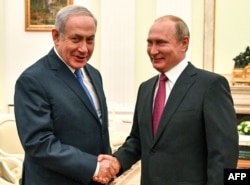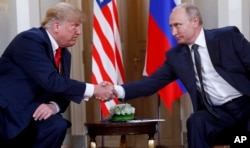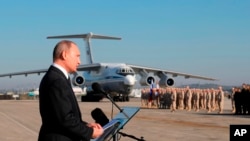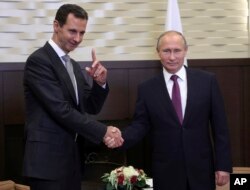As Syrian President Bashar al-Assad consolidates his power over territories regained from Syrian rebel groups with the help of Iran and Russia, some experts charge that Iranian-backed proxies have started to go beyond their original mandate, which might prompt action from both Assad and Moscow to control Tehran’s growing influence in Syria.
“Iranian contribution to defeat the campaign against Assad was critical, but they have accomplished that objective by and large, and now they are in a new situation in which Iran’s presence in some respect complicates considerations both of the Russians and certainly Damascus as well. That’s not even beginning to address Israel and (the) United States’ concerns,” Geoffrey Aronson, an analyst at the Middle East Institute, told VOA.
Aronson, who is also president of the Mortons Group, a Washington-based consultant group, added that all parties understand the unwritten rules of the game, but these rules remain unstable and encourage the kinds of efforts that have been seen on the part of Iran and its attempts to extend its influence in Syria.
Iran’s growing influence in Syria has also concerned Israel, which shares a border with Syria and does not want Iran to destabilize the region. Last week, Israeli Prime Minister Benjamin Netanyahu traveled to Moscow to meet with Russian President Vladimir Putin to discuss regional stability and Israel’s national security, particularly along the country’s border region with Syria.
Ali Akbar Velayati, a top adviser to Iranian Supreme Leader Ali Khamenei, also traveled to Russia last week and met with Putin, reportedly conveying a message from Khamenei.
Afterward, Velayati said Iran values its relations with Russia and will continue its cooperation with the country in Syria.
Helsinki summit
The meetings took place ahead of Monday’s long-awaited summit between U.S. President Donald Trump and Putin in Helsinki, Finland’s capital. The two men reportedly discussed a number of global issues, including Iran’s destabilizing efforts in the region.
Trump said during a joint press conference with Putin that the U.S. would not allow Iran to take advantage of the successful campaign against the Islamic State (IS) in the region.
“I also emphasized the importance of placing pressure on Iran to halt its nuclear ambitions, and to stop its campaign of violence throughout the area, throughout the Middle East,” Trump said.
Ahead of the summit, experts and U.S. officials had expressed optimism that Russia would help the U.S. bring Iran under control in Syria.
U.S. Secretary of State Mike Pompeo told the U.S. Congress last month that he would “applaud it” if the Russians could get the Iranians out of Syria.
“The answer with respect to the Russian capacity to do that is an open-ended question,” Pompeo told U.S. lawmakers.
“The U.S. administration has shifted its focus from Assad must leave to Iran must leave,' and this is the administration's main line when it comes to Syria. It’s not about Assad, it’s not about the regime,” Hanin Ghaddar, an expert at the Washington Institute for Near East Policy, told VOA.
Russia stance
Russian officials, however, said that expecting Russia to exert pressure on Iran is an unreasonable demand. Last week, Dmitry Peskov, a spokesperson for Putin, denied media reports suggesting that Russia might put pressure on Iran to withdraw from Syria.
“When reports that two countries are discussing a third country and are making some decisions for it that's highly unrealistic,” Peskov said.
Ghaddar, of the Washington Institute, believes the real issues is whether Russia really wants to clip Iran’s influence in Syria.
“The Russians still need the Iranians in Syria because the Russians do not control the land while the Iranians do, and this is a factor of power the Iranians are using,” Ghaddar told VOA.
Ghaddar added that Russia and Iran’s interests in Syria could overlap in some areas, but they are different. She said Russia is investing in the Syrian state institutions and the presidency, while Iranians are implementing their usual strategy of creating parallel institutions similar to Hezbollah in Lebanon.
“In Syria, they do understand (that) when their parallel institutions start to penetrate state institutions, this is a red line for Russia,” Ghaddar said.
Assad
Some countries of the region have also come to the realization that Assad might very well remain in charge of Syria as the regime is regaining control of the majority of the land it lost to various rebel groups when the civil war broke out in 2011 and when the Islamic State terror group emerged in 2014
Israel’s Netanyahu said last week that Israel has no conflicting interests with the Assad regime regarding exerting power and stabilizing the country.
“What has troubled us is ISIS and Hezbollah and this has not changed. The heart of the matter is preserving our freedom of action against anyone who acts against us. Second, the removal of the Iranians from Syrian territory,” Netanyahu said in Moscow, using an acronym for IS.
The situation between Israel and Iran escalated last May after Israel accused Iran of firing missiles at the Golan Heights, which prompted Israel to launch airstrikes in retaliation.
Over the past several months, Israeli jets have targeted a number of Iranian targets inside Syria, mainly the T4 airbase located in Homs governorate in central Syria, which reportedly hosts a unit of the Iranian Revolutionary Guards Corps (IRGC).








